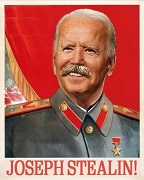|
Subvisual Haze posted:I have been watching through the World at War on Youtube and so far it is quite interesting. Holy poo poo though I wish they had subtitles on some of working class British people that they interviewed, those are some thick accents. Ya neva neew whin the groun' was gonna arrrrupt underneathya! quote:I just watched the episode on Barbarossa, and they seemed to be arguing that Stalin knew war was coming with Hitler and was effectively reforming the army for the conflict, but the war just started before he was fully prepared. Am I correct that this is at odds with current thinking? I had always got the impression that Stalin was caught with his pants down, ignoring intelligence reports that an attack was imminent, and not preparing half as well as he could have if he thought an attack was guaranteed. It's kinda both, and as I mentioned the last time this came up the episodes dealing with the Soviets tend to be the ones with the most historical inaccuracies. Largely, this is a problem of source material since the series was shot during the height of the Cold War and they in large part had to deal with information from ex-pats who weren't as up to date on things as might've been hoped (to put it kindly). Stalin knew that war was coming with the Nazis sooner or later and was gambling they'd be fighting the Western Allies much longer than ended up happening (and he needed all the time he could get due to how disastrous the Red Army had performed during the Winter/Continuation War). In the event, he also let his paranoia get the better of him because many of the early warnings of Barbarossa came from British Intelligence which he thought was a ploy to get him to attack first, and thus take the pressure off the beleaguered British (then struggling under the Blitz and, mistakenly, anticipating a cross-channel invasion any day). So in short: he knew an attack was coming sooner or later, but when it actually happened he initially was caught flat-footed and refused to see what was about to happen. Captain_Maclaine fucked around with this message at 20:55 on Jan 2, 2016 |
|
|
|

|
| # ? Jun 11, 2024 00:26 |
|
Subvisual Haze posted:I have been watching through the World at War on Youtube and so far it is quite interesting. Holy poo poo though I wish they had subtitles on some of working class British people that they interviewed, those are some thick accents. Barbrossa happened during a perfect storm of awful crap for the Red Army. Stalin respected Hitler in the way that normal people would respect him, in that Hitler was dangerous and unpredictable. The Red Army was in bad shape after The Winter War. Stalin purged thousands of officers from the army and replaced them mostly with really raw officers, there were divisions between the brass about strategic/tactical theory, there was a lot of equipment in various degrees of maintenance states, ammo shortages among certain units, replacements after the war with Finland... the list is huge. The Red Army was a surprisingly forward-thinking military force with sound doctrines and modern equipment and tactics, but it was just in a really sorry state at the time of Barbarossa. Pure speculation on my part, but Stalin liked control, so I don't think he wanted a panic over a German invasion, especially after finally passing Molotov-Ribbentropp and all of the recouping the military had to do after the wars in Finland and Poland. I agree in that I think the Soviets knew it was coming, but needed to bide as much time as possible. More content: This was linked to me recently. It's a lecture specifically on different standards for tank procurement and production. Interesting points are the production methods of the USSR, and the problems with the vaunted "German Engineering" during the war: https://www.youtube.com/watch?v=N6xLMUifbxQ Plan Z fucked around with this message at 22:32 on Jan 2, 2016 |
|
|
|
Anything available online about how George Marshall was amazing? Because I've heard he was amazing.
|
|
|
|
hello friends. just posting to say that i like this thread and to recommend this 6 part documentary https://www.youtube.com/watch?v=6t6IKwHpdIQ
|
|
|
vyelkin posted:Well, it means they were off the table as potential mediators but it also means that the one remaining military formation the Japanese had that they thought remained strong (the Kwantung Army, which was always significantly stronger on paper and in Japanese elites' minds than it was in the real world) was utterly crushed in a matter of days. American naval campaigns showed the Japanese were conclusively defeated at sea and August Storm showed they were conclusively defeated on land. It essentially meant they had no hope of any kind of victory, the best they could hope for was a horrific bloodbath of an Allied invasion of Japan. And the atomic bombs showed that even that wasn't necessarily an option because America could wipe out entire cities in one go. It's certainly a combination of factors but don't dismiss the Soviet invasion. Nobody in a position of power in Japan had any illusions about victory. Their goal was to wear down the Americans to the point of agreeing to a negotiated peace. During the immediately prewar period, this peace would involve the Japanese withdrawing from China and Indochina, in exchange for which the Americans would mediate between the Japanese and the KMT, and would also withdraw their embargo. By the end of the war, this had reached the point of giving up everything they'd acquired since the end of the Russo-Japanese War, and, eventually, giving up Taiwan and Korea. Now, there were people who had confidence in "final victory", but they were the ultranationalist junior officers, and while they constrained the political maneuvers of the military and civilian leadership via fear of assassination and coups, in the end they had no base of authority with anyone besides themselves. The apparent imperturbable Allied morale combined with the collapsing civilian morale in Japan is also a gigantic factor in the decision to surrender, and one that goes underappreciated, I think, because it goes beyond the materialistic conception of WW2 (and war generally) that's most common in lay discussions and into the thorny territory of distinguishing between civilians and elites.
|
|
|
|
|
were there any work or student protests in Japan during the war? The narrative is always keen on pointing out how the Japanese were willing to die for the Emperor like they were bullet ants, meanwhile the social condition of Japan is entirely ignored in all history books.
|
|
|
Mans posted:were there any work or student protests in Japan during the war? The narrative is always keen on pointing out how the Japanese were willing to die for the Emperor like they were bullet ants, meanwhile the social condition of Japan is entirely ignored in all history books. A significant number of kamikazes were college students who had protested against the war, publicly or privately. But I'm not sure if there are any good English-language (or Japanese-language, even) sources on the later part of the war. Earlier, most dissent was private and on an individual level, and the same for military dissent. edit: Ah, here we go: http://www.amazon.com/Grassroots-Fa...G8M0G3TCGBKJBPS Effectronica fucked around with this message at 00:28 on Jan 3, 2016 |
|
|
|
|
LordArgh posted:hello friends. just posting to say that i like this thread and to recommend this 6 part documentary This video contains content from CBS, who has blocked it in your country on copyright grounds. Sorry about that. Anyway, has anyone read Ivan's War: Life and Death in the Red Army, by Catherine Merridale? http://www.amazon.com/Ivans-War-Life-Death-1939-1945/dp/0312426526 It was recommended in the Eastern European thread, and I've started it, but while it is thorough, I find it very dry and, well, boring, which isn't normal for me. Something about the prose or something is just dull or something. Is it worth a read?
|
|
|
|
cheerfullydrab posted:Anything available online about how George Marshall was amazing? Because I've heard he was amazing. I can't think of anything online unfortunately, but I'd recommend Mark Stoler's George C. Marshall: Soldier-Statesman of the American Century both because it's a good book and Stoler was my undergrad adviser way back when and I'm still very occasionally in touch with him.
|
|
|
|
So I watched this the other day: https://www.youtube.com/watch?v=bN6bfVJmhbc It got me thinking: would it really made any difference if Germans had managed to capture Stalingrad?
|
|
|
|
Fish of hemp posted:So I watched this the other day: By the end of it, the Germans had completely shut down the city, but they had invested so many troops into the city that they couldn't stop the Soviets from obliterating the Romanian/Hungarian armies in the surrounding countryside and surrounding the remaining Germans completely.
|
|
|
|
Fish of hemp posted:So I watched this the other day: Not really. Most of Germany's problems were caused by logistics. They lost a huge number of trucks in Poland and France, so a substantial amount of resupply was done by horse. If they somehow were able to capture Stalingrad and the oil fields, and weren't too battered to keep moving, they didn't have the logistical train or production capacity to make any deep push.
|
|
|
|
Fish of hemp posted:So I watched this the other day: Not really but if they captured it straight away it'd make more of a difference than say if they took it in October.
|
|
|
|
Fish of hemp posted:So I watched this the other day: It would have made for nice propaganda, but would have been unlikely to change the war. Germany's best chance was to force Stalin to the negotiating table somehow and I can't think of any reasonable way they could have managed that. Politically, the Germans squandered opportunities in the Ukraine and Baltic nations through genocidal policies and collective punishment. They waged a war of annihilation that would hamper any attempt at a Franco Prussian style settlement with the USSR. And they fundamentally lacked the manpower to eliminate Red Army resistance. I doubt even an early capture of Moscow would have allowed them to win, the Soviets could always just retreat further east. Largely because Stalin had a near unbreakable grip on the USSR there was no possibility of convenient regime change as in WW1. Then you pull the US into the war and the atomic bomb still negates any hope for victory (though that was not known as the time in any event).
|
|
|
|
asdf32 posted:There is a reason the atomic bomb is historically notable and the reason is scale. When things change scale significantly they take on a new character and send a new message. historically notable has nothing to do with japan understanding that the united states were willing and capable of destroying japanese cities by bombs. whether they use a thousand bombs or a single bomb is irrelevant to the people being bombed. operation meetinghouse and the firebombing of tokyo was far more destructive than either hiroshima or nagasaki
|
|
|
|
The apocalyptical quality of the atomic bomb is relevant to the morale of the leadership. The fact that they did it in one single bomb definitely had an effect. They surrendered shortly afterwards.
|
|
|
|
Yeah I don't think the Japanese were under any confusion about the US willingness to utterly devastate their population centers, however the ability to do it with a single bomb instead of thousands of tons worth probably highlighted the futility of further hostilities.
|
|
|
|
Popular Thug Drink posted:historically notable has nothing to do with japan understanding that the united states were willing and capable of destroying japanese cities by bombs. whether they use a thousand bombs or a single bomb is irrelevant to the people being bombed. operation meetinghouse and the firebombing of tokyo was far more destructive than either hiroshima or nagasaki In terms of the moral question of whether Americans were willing to kill the Japanese there is no question. But the subject of whether Americans would continue going all out for unconditional rather than conditional surrender is seperate as demonstrated by the Japanese pursuit of that end. The bomb sent a clear message there.
|
|
|
|
Plan Z posted:Not really. Most of Germany's problems were caused by logistics. They lost a huge number of trucks in Poland and France, so a substantial amount of resupply was done by horse. If they somehow were able to capture Stalingrad and the oil fields, and weren't too battered to keep moving, they didn't have the logistical train or production capacity to make any deep push. The other issue is that even if they took Stalingrad, it doesn't mean they could easily take the Caucasus, especially since German forces were already struggling to even reach them in the first place. The Russians could easily still supply the Caucasus either through Astrakhan or other Caspian Ports, and the Soviets had supply lines through Iran via the British. If anything, the Germans could be facing a long grueling battle through the Caucasus with entrenched resistance, and they didn't have half the men they needed. The Germans if anything were several steps removed from the possibility of victory, the question was the additional amount of lives on both sides wasted and time.
|
|
|
|
Thump! posted:Yeah I don't think the Japanese were under any confusion about the US willingness to utterly devastate their population centers, however the ability to do it with a single bomb instead of thousands of tons worth probably highlighted the futility of further hostilities. they already understood the futility of further hostilities. by august 1945 the japanese leadership was simply trying to lose the war in a way that wouldn't end in mass trials/executions or the destruction of what they saw as core parts of japanese society like it's kind of insulting to assume that japanese commanders didn't realize that the war was over until the bomb fell, when during the previous 9 months the americans were freely flying over japan bombing and strafing at will with no effective response from the defense asdf32 posted:But the subject of whether Americans would continue going all out for unconditional rather than conditional surrender is seperate as demonstrated by the Japanese pursuit of that end. yeah i think they got the message by oh the second or third massed b29 raid the problem with this 'bomb won the war' fallacy is that it hooks into the natural human tendency to create narratives. ww2 is already about the most white hat black hat cops and robbers war on record, and when it climaxes with a great big powerful superweapon it's really hard to break away from the idea that the superweapon was important, especially when that superweapon then went on to be crucial and terrifying for another half century boner confessor fucked around with this message at 00:16 on Jan 4, 2016 |
|
|
|
it's also kind of silly to point at the atomic bomb and say "well it lets one bomber be as destructive as a thousand bombers" as if our ability to send unescorted pairs of bombers just merrily along carrying highly secret and experimental devices deep over enemy territory isn't enough of an indicator that they weren't necessary to militarily subdue the enemy
|
|
|
|
Thump! posted:Yeah I don't think the Japanese were under any confusion about the US willingness to utterly devastate their population centers, however the ability to do it with a single bomb instead of thousands of tons worth probably highlighted the futility of further hostilities. Take a look at pictures of Tokyo, then Hiroshima. Even more fun if you have someone else do it for you. You will be guessing. The only way to tell which is which really is to look at the river that runs through them. Total devastation no matter what, the one-shot nuke aspect was closer to a gimmick than a major deciding point. e: quick example. Know your rivers? http://imgur.com/a/lVfey Herv fucked around with this message at 00:39 on Jan 4, 2016 |
|
|
|
So I watched this, and after watching a couple other lecture videos on that channel I got to this one: https://www.youtube.com/watch?v=23vL8AvqbDc And I have to ask, were there any other blatant goddamned liars who were taken seriously (Even if only for a short time) by WW2 historians?
|
|
|
|
Popular Thug Drink posted:they already understood the futility of further hostilities. by august 1945 the japanese leadership was simply trying to lose the war in a way that wouldn't end in mass trials/executions or the destruction of what they saw as core parts of japanese society Right, and the bomb was a factor ending their hope in that. quote:like it's kind of insulting to assume that japanese commanders didn't realize that the war was over until the bomb fell, when during the previous 9 months the americans were freely flying over japan bombing and strafing at will with no effective response from the defense Got it. Though a blunderbuss really isn't the same thing as a machine gun.
|
|
|
|
asdf32 posted:Got it. Though a blunderbuss really isn't the same thing as a machine gun. it doesn't matter which one you have when your enemy is lying helpless at your feet. it's ok to be wrong sometimes asdf32, it doesn't make you any less of a person
|
|
|
|
Popular Thug Drink posted:it doesn't matter which one you have when your enemy is lying helpless at your feet. it's ok to be wrong sometimes asdf32, it doesn't make you any less of a person I don't think you can really say japan was lying helpless at our feet. If we had been forced to invade it would have been extremely bloody.
|
|
|
|
drilldo squirt posted:I don't think you can really say japan was lying helpless at our feet. If we had been forced to invade it would have been extremely bloody. yeah i guess we could have invaded the starving broken country with no capacity to attack anyone outside of their borders if they really twisted our arm about it any invasion of japan was rooted more in the inertia of advance and trying to maintain momentum than any actual need to invade to end the war. of course this is hindsight and the american military couldn't have known that, as when you're busy fighting a war you tend to continue fighting the war until the war is formally over. this is the same reason we dropped the bombs - we spent billions making the things, we have an enemy to drop them on, so it's not like we're not going to use them. but it wasn't necessary to use them, by 1945 japan had lost and it was just a question of admitting it boner confessor fucked around with this message at 01:34 on Jan 4, 2016 |
|
|
|
They didn't want to end the war in a way we saw as fair to us and america decided to press the point.
|
|
|
|
Would it have been feasible to blockade the Japanese Islands and smother their empire like that, or was the 'atomic bomb' / 'ground invasion of the islands' dichotomy the only reasonable choice? I'm just having a hard time believing that killing hundreds of thousands to millions of civilians was the only option.
|
|
|
|
Popular Thug Drink posted:it's also kind of silly to point at the atomic bomb and say "well it lets one bomber be as destructive as a thousand bombers" as if our ability to send unescorted pairs of bombers just merrily along carrying highly secret and experimental devices deep over enemy territory isn't enough of an indicator that they weren't necessary to militarily subdue the enemy It's pretty easy to ignore everything you have to say about this when Popular Thug Drink posted:it is both, but americans really hate the idea that japan didn't just crumble at the fear of nuclear weapons can be found on the previous page, illustrating exactly where you truly stand on the issue. You have no interest in actually discussing this "fairly", you just want toss some casual insults at "americans" while completely discounting the actual effect the bombs did have. Additionally, people like you further discount just how utterly horrible all of the other "options" the Allies (or "ebil americans" if I sink to your particular level) discarded when deciding on how exactly to deal with Japan. It is beyond my comprehension that people in this very thread have suggested STARVATION as a viable alternative to the atomic bombs, though I suspect this comes from people who have never understood the concept of starvation, much less experienced what it means to be so hungry that you are actually suffering from this (because goons are fat, lol). Atomz are scary i guess, but not so scary that they didn't influence Japan's choice to accept the terms thrust upon them, i mean its not like the emperor himself did not mention them in his address to the people Emperor Hirohito posted:But now the war has lasted for nearly four years. Despite the best that has been done by everyone – the gallant fighting of the military and naval forces, the diligence and assiduity of Our servants of the State, and the devoted service of Our one hundred million people – the war situation has developed not necessarily to Japan's advantage, while the general trends of the world have all turned against her interest. Pretending the bombs did not have any impact whatsoever on the Japanese will to fight is hilariously naive and outright revisionism at best. Note that by saying this, I am not saying that OTHER FACTORS simply did not exist or were not AS or MORE effective. The bombs themselves come at the very end of a wide variety of things that led to Japan's ultimate defeat and surrender. Generally, the Japanese wanted to keep as much of what they had taken from other peoples as possible before the war's inevitable, unfavorable end. Most people like yourself seem to think it would have been better to allow this, either ignoring or being ignorant of exactly what Imperial Japan was doing to the populations it occupied or attacked, than to drop the two atomic bombs. At this point, I think people like you actually don't give a poo poo about the lives of innocents killed during the war, so much as you want to prove that the US did a BAD THING on Something Awful. To that, this American says: "No poo poo?" Mystic_Shadow posted:Would it have been feasible to blockade the Japanese Islands and smother their empire like that, or was the 'atomic bomb' / 'ground invasion of the islands' dichotomy the only reasonable choice? I'm just having a hard time believing that killing hundreds of thousands to millions of civilians was the only option. We'd effectively crippled their shipping to a massive extent even before the bombs were dropped. Their Navy was no longer capable of stopping a direct approach on the home island even before Hiroshima and Nagasaki. They barely had the means to meaningfully contest the raids leading up to the use of the bombs. The Japanese population was already in great danger of being starved as things stood. Additionally, we DID try it: https://en.wikipedia.org/wiki/Operation_Starvation "After the war, the commander of Japan's minesweeping operations noted that he thought this mining campaign could have directly led to the defeat of Japan on its own had it begun earlier. Similar conclusions were reached by American analysts who reported in July 1946 in the United States Strategic Bombing Survey that it would have been more efficient to combine the United States' effective anti-shipping submarine effort with land- and carrier-based air power to strike harder against merchant shipping and begin a more extensive aerial mining campaign earlier in the war. This would have starved Japan, forcing an earlier end to the war." Of course, it's very easy after any event to look back and say "well maybe you could have done this" and use that as a way of passing moral judgement on people in a country 70 years after the fact, like Popular Thug Drink has, but it's best to ignore shitposters like them. fivegears4reverse fucked around with this message at 01:43 on Jan 4, 2016 |
|
|
|
^^ i didn't read another word of this post once it became clear that you're just upset that i'm poo poo talking the bombsMystic_Shadow posted:Would it have been feasible to blockade the Japanese Islands and smother their empire like that, or was the 'atomic bomb' / 'ground invasion of the islands' dichotomy the only reasonable choice? I'm just having a hard time believing that killing hundreds of thousands to millions of civilians was the only option. if the soviets hadn't declared war, and if operation olympic had been postponed, then millions of japanese civilians would have starved during the winter of 1945-46. japan was already cut off through submarine blockade and aerial mining of ports and the railroads couldn't move during the day without being attacked. it's really a question of how much destruction the military dictatorship was willing to tolerate to get favorable peace deals, which looking at the spring-summer 1945 bombing campaings indicates "a whole lot" either way lots of civilians were going to die and ironically the way it ended was the least fatal boner confessor fucked around with this message at 01:40 on Jan 4, 2016 |
|
|
|
Popular Thug Drink posted:i didn't read the usual thing you do before responding in most threads
|
|
|
|
Anyone know how the japanese army's treatment of civilians in okinawa affected the decision to drop the bomb? Were japanese civilian casualties actually considered in the decision making?
|
|
|
|
Mystic_Shadow posted:Would it have been feasible to blockade the Japanese Islands and smother their empire like that, or was the 'atomic bomb' / 'ground invasion of the islands' dichotomy the only reasonable choice? I'm just having a hard time believing that killing hundreds of thousands to millions of civilians was the only option. The original plan for defeating Japan as outlined in War Plan Orange outlined a total naval blockade of the Home Islands as its endgame, but that was mostly due to how WPO was formulated in the 1920s-1930s and hadn't quite caught up to advancements in technology yet. In the event, the Home Islands were placed under a total naval blockade, and it would have been entirely feasible to continue to do so from an implementation perspective, but massed strategic bombing, atomic bombing and a direct ground invasion were all put into effect for the former and heavily considered for the latter because of concerns over how much longer the war might drag on if Japan were "just" being blockaded.
|
|
|
|
So essentially the Japanese were defeated but wouldn't sign a truce, we had already blockaded the home islands, and the Japanese leadership was willing to kill off their own people to save face, and the bombs were the most humane action. That's pretty rough, but thanks for the explanation.
|
|
|
|
Popular Thug Drink posted:
This is missing the fact that Stalin certainly knew about the bomb, via spies, since at least 1942. He probably knew about the decision to drop it, and in any case by his nature wouldn't have believed it could be created and not used. So it is going off into alt-history land to think that without the bomb he would still have invaded, instead of accepting whatever concessions the Japanese would have offered for neutrality. In that fantasy-land with no bomb, what are his motivations for attacking supposed to even be?
|
|
|
|
I'd be careful with a humanitarian characterization with regards to the Japanese. The Allies wanted to end the war because war weariness would be setting in (if it hadn't already), continued mobilization is expensive, and even a blockade is going to result in casualties.
|
|
|
|
Herv posted:Take a look at pictures of Tokyo, then Hiroshima. Even more fun if you have someone else do it for you. You will be guessing. The only way to tell which is which really is to look at the river that runs through them. The T-Bridge is from Hiroshima, right? As I recall they used it as an aiming point for that fuckoff sized bomb.
|
|
|
|
Mystic_Shadow posted:So essentially the Japanese were defeated but wouldn't sign a truce, we had already blockaded the home islands, and the Japanese leadership was willing to kill off their own people to save face, and the bombs were the most humane action. That's pretty rough, but thanks for the explanation. Close, but looking at communications between Japanese officials towards the end of the war, the bomb wasn't really this huge gamechanger that came out of nowhere and forced them to surrender, or at least if it was, the USSR joining the war also had the same effect. And the USSR joining was only such a problem because it meant Japan lost a negotiating partner and the USSR wiped out the Kwangtung Army, which were basically the one land force they had that was doing more or less okay up until they got wiped out. Sure, the bomb got attention, and in some ways I think it did underscore for the Japanese military government just how little the blockades and bombings were costing the USA compared to Japan, but it's a far cry from saying that without it the blockade would have to kill even more people. radmonger posted:So it is going off into alt-history land to think that without the bomb he would still have invaded, instead of accepting whatever concessions the Japanese would have offered for neutrality. In that fantasy-land with no bomb, what are his motivations for attacking supposed to even be? Securing territory formerly held by the Japanese army and establishing USSR-friendly regimes. Nuke or no nuke, the fate of Manchuria and Korea were still problems for the USSR.
|
|
|
|

|
| # ? Jun 11, 2024 00:26 |
|
DarklyDreaming posted:So I watched this, and after watching a couple other lecture videos on that channel I got to this one: I'd say a mixture of lying, problems with perspective, talking too confidently about things, or were just wrong/misremembering. It can sometimes be as simple as "There weren't as many of X type of tank as people think there were, because it's kind of goddamned hard to tell exactly type of tank that grey box 500+ meters away is, so every German tank was a Tiger." Sometimes it's all three. Due to the Cold War, most of the info we got on the Eastern Front was from German sources or handfuls of Soviet ex-pats filtered through post-war American political leanings. So the stories of waves of soldiers sent forth weaponless by their cruel, uncaring communist masters didn't have much word or evidence to the contrary after Western historians were able to get into Russian archives. Since then, better information has been coming out, so it's been a bit of a battle changing peoples' minds.
|
|
|























